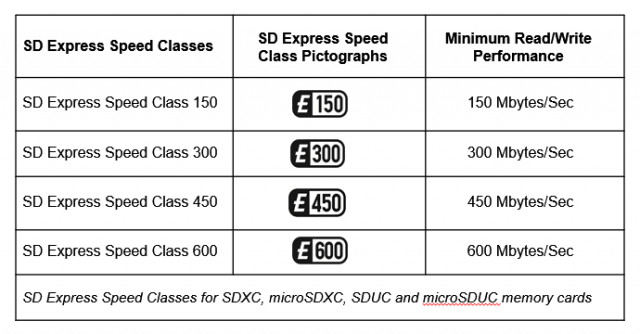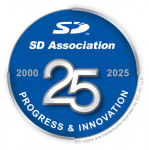microSD Express Doubles Speeds, New SD Express Speed Classes Introduced
New SD 9.1 Specification defines new speed class with multi stream access for SD Express Cards
The latest generation of microSD Express uses the PCIe interface delivering a 1,969 megabytes per second (MB/s), nearly 2 gigabytes per second (GB/s) speeds by using the PCIe Gen4 x1 lane as defined in the latest update to the microSD Addendum version 8 specification. microSD Express was introduced with 985 MB/s speed maximum data transfer rate and the NVMe upper layer protocol in the SD 7.1 specification. The increase in speed gives product designers more storage options and SSD level performance for a variety of size constrained devices requiring easily repairable or upgradeable storage.
The SD Express Speed Classes are used exclusively on SDXC, SDUC, microSDXC and microSDUC memory cards offering the SD Express bus. Changes in memory technology necessitate the need to define speeds as NAND flash technology continues to evolve. SD Express is the most significant evolution for SD since it was introduced in 2000. It meets new and evolving market needs to support increased performance requirements of controllers, memories, and other application interfaces. SD Express can fully support almost every use case demanding higher speed removable or semi-removable memory cards and is ideal for meeting the growing number of Right to Repair laws.
“By defining minimum assured sequential performance standards for SD Express memory cards, the SDA helps both device manufacturers and consumers ensure the best recording and playback of all types of content,” said Hiroyuki Sakamoto, SDA president. “We doubled the speed of microSD Express to 2GB/s to give product manufacturers more storage options capable of handling the most demanding storage uses making SD Express memory cards a compelling, ecologically sound choice making it easier to repair and upgrade devices.”
New Features
In order to optimize the SD Express speed class usage under various power levels and thermal conditions - Leveraging NVMe specifications, SD Express memory card now offer several Power Management settings through Maximum Power (MP) values. The card consumes power up to one of the MP values set by the host device to manage card temperatures. SD Express memory cards use a new Thermal Management feature where the card indicates a group of its specific thermal thresholds. The host device may then set appropriate Thermal Management parameters for the card according to the target class and the selected PCIe bus mode, much like an MP value for power management.
The SD 9.1 specification defines the access rules required to ensure the minimum defined performance of the PCI/NVMe interface in SD Express cards, including multi-stream access of up to eight streams.
The SDA has prepared a whitepaper providing more details about the new features and SD Express Speed Classes defined by SD 9.1.
SD Express
A growing list of devices and memory cards support SD Express. SD Express offers SSD performance levels with transfer speeds up to ~4GB/sec thanks to the PCI Express® (PCIe®) and NVMe Express™ (NVMe™) architectures. The first SD Express cards were introduced with SD7.0 specifications for the full-size SD form factor supporting PCIe Gen 3 x1 interface with speeds of 985 MB/s. SD8.0 defines three additional PCIe interfaces - PCIe Gen 4 x1, PCIe G3 x2 and PCIe Gen4 x2 quadrupling speeds to 4GB/s. SD7.1 specification added SD Express 985 MB/s to the microSD form factor and the microSD Addendum version 8 specification doubled speeds to 2 GB/s by using PCIe Gen 4 x1. SD Express gigabyte transfer speeds bring new storage opportunities for devices with demanding performance levels capable of moving large amounts of data generated by data-intense wireless or wired communication, super-slow motion video, RAW continuous burst mode and 8K video capture and playback, 360 degree cameras/videos, speed hungry applications running on cards and mobile computing devices, ever evolving gaming systems, multi-channel IoT devices and automotive to name a few.
SD Association
The SD Association is a global ecosystem of nearly 800 technology companies charged with setting interoperable SD standards. The Association encourages the development of consumer electronic, wireless communication, digital imaging and networking products that utilize market-leading SD technology. The SD standard is the number one choice for consumers and has earned more than 80 percent of the memory card market with its reliable interoperability and its easy-to-use format. Today, smartphones, tablets, drones, IoT devices, HDTVs, audio players, automotive systems, computers, digital cameras and digital video cameras feature SD interoperability. For more information about SDA or to join, please visit the Association’s website, https://www.sdcard.org.
SD logos are trademarks licensed by SD-3C LLC.
PCIe® - PCI Express, is a standard developed by PCI-SIG® and PCIe® is a trademark owned by PCI-SIG.
NVMe™ - NVM Express™, is a standard developed by NVM Express Inc. and NVMe™ is a trademark owned by NVM Express Inc.
View source version on businesswire.com: https://www.businesswire.com/news/home/20231019426797/en/
Website: http://www.sdcard.org/
Contact
SD Association
Kevin Schader
1.925.275.6670
media@sdcard.org
This news is a press release provided by SD Association.



